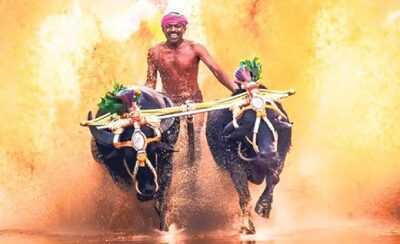
The serene coastal region is deeply rooted in traditions, customs, and age-old practices, making it a unique blend of history and festivity, among the many cultural elements cherished by the people, the traditional buffalo race known as Kambala holds a place of pride.
Kambala, a vibrant and historic buffalo racing festival, dates back to the era of the Alupa dynasty and is a symbol of agrarian pride. This sport, deeply embedded in the coastal culture, showcases the strength, agility, and coordination between buffaloes and their handlers. Historically, farmers conducted Kambala after completing the agricultural season to test the endurance of their buffaloes and seek divine blessings for a prosperous harvest.
There are four main types of Kambala races: Pancha Kambala, Bandasale Kambala, Kaaretta Kambala, and Noda Kambala. These races usually take place between October and March, attracting participants and spectators from across the region.
The race is held in a specially prepared slushy paddy field, known as the Kambala Gadde. To ensure an ideal track, farmers mix the soil with an adequate amount of sand and water, creating a perfect muddy surface for the buffaloes to race on. The race field is adorned with mango leaf decorations, and the event begins with a ceremonial prayer to the village deities. Traditional rituals, including the offering of betel leaves and coconuts, mark the inauguration of the race.
There are two primary categories of Kambala races:
Single-Track Kambala – where individual buffaloes run.
Pair-Race Kambala – where two buffaloes are yoked together and raced.
Buffaloes participating in Kambala are well-trained and often treated with great reverence by their owners. The festival also features processions, where handlers and participants arrive dressed in traditional attire, adding to the cultural splendor.
Kambala is not just a sporting event but a cultural celebration that unites villages, revives folklore, and creates an atmosphere of festivity with folk music, dance, and religious ceremonies. For the people of Baindur and surrounding areas, Kambala is a reflection of their deep connection with nature, their agricultural heritage, and their unwavering commitment to preserving their traditions.